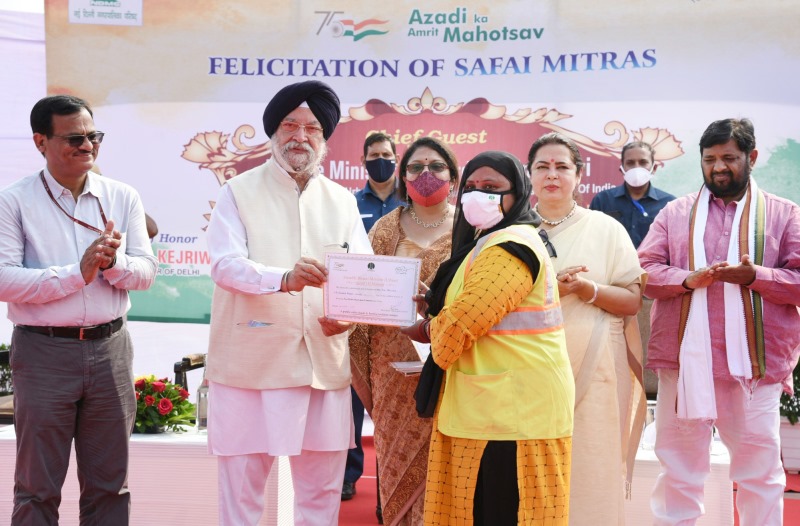Swacch Bharat Mission 2.0 Focuses on Garbage Free Cities

Swachh Bharat Mission-Urban 2.0 is led by the Ministry of Housing and Urban Affairs (MoHUA), Government of India. It marks a shift from the initial Swachh Bharat Mission-Gramin (rural) approach, where the focus was sanitation and toilets. Over the past seven years, the Swachh Bharat Mission has harnessed the commitment of a hundred and thirty crore Indians towards building a Clean India through this largest sanitation revolution in the world. The transformation of cleanliness in India over this period has been remarkable, with all the states and union territories have now largely become Open Defecation Free (ODF)
Simultaneously, the practice of segregating waste at source has been adopted across 87% of wards in the country, and waste processing has gone up nearly four times, from 18% in 2014 to 71% in the present day. You can help too, by ensuring that you only buy dustbins that allow waste segregation. In this journey towards swachhata or cleanliness, Chhattisgarh was found to be one of the cleanest states in India (in the category of ‘more than 100 Urban Local Bodies or ULBs’) for 3 consecutive years under Swachh Survekshan survey. It was also the Best State in the SafaiMitra Suraksha Challenge run by MoHUA. Among its Urban Local Bodies, Ambikapur and Patan have been adjudged as 5-star Garbage Free Cities, while 44 ULBs have been certified as 3-star Garbage Free cities.
The Swachh Bharat Mission-Urban 2.0 was launched by Prime Minister Narendra Modi with the overall vision of creating garbage free cities. The Mission is being implemented under the overarching principles of waste from wealth, and circular economy for maximizing resource recovery from what was previously considered waste. In this process, the Mission is focusing on creating an enabling ecosystem for opening up of entrepreneurial opportunities in the sanitation sector through social enterprise development, especially among the economically weaker sections of society. Women empowerment is another key focus which is aimed to be realized through Swachh Bharat Mission-Urban 2.0.
Social Enterprises for Garbage Free Cities Conclave
The MoHUA will be organizing a national conclave on Social Enterprises for Garbage Free Cities: Encouraging Women Entrepreneurs in Waste management in Raipur in collaboration with the Government of Chhattisgarh. The National Conclave is being organised on 3 March 2022 and Chhattisgarh has been chosen as its venue due to the great achievements made by this state for achieving the targets of Swacch Bharat Mission. The Urban Development Minister, Chhattisgarh; Mayor of Raipur Municipal Corporation; the Secretary, MoHUA; and Chief Secretary Chhattisgarh are some of the dignitaries expected to participate in this National Conclave.
The day-long event will serve as a platform for peer learning for states and Urban Local Bodies (ULBs) about various centralized and decentralized waste management practices and will build capacity. A National Capacity Building Framework for Garbage Free Cities under SBM-Urban 2.0 will also be released. Representatives from nearly 17 states and their ULBs including from North-eastern states of Assam, Arunachal Pradesh and Nagaland, UTs such as Jammu & Kashmir, Chandigarh and Ladakh, and other states such as Madhya Pradesh, Maharashtra, Uttar Pradesh and Tamil Nadu are expected to participate in the day-long conclave. The day will begin with participants engaging in an on-ground cleanliness drive on the banks of the River Mahanadi along with NCC cadets followed by a visit to the Solid Liquid Resource Management (SLRM) Centre at Patan.
A key attraction of the day-long event will be presentations of various women-led waste management initiatives from across the country. The will include Hasiru Dala, a Bangalore-based organization works with waste pickers to transform them into waste entrepreneurs; Cuttack Municipal Corporation in Odisha which is working to empower transgender-led self-help groups by engaging them as waste operators; Pune’s Red Dot campaign by SWaCH co-operative which is working to spread awareness about menstrual health and sustainable disposal of sanitary waste among others. Launch of theme song Swachhata Jaari Hai (cleanliness drive is ongoing) will also take place in this national conclave which will be webcasted live.
Swachh Bharat Mission-Urban 2.0 was launched on 1 October 2021 and aims to achieve its vision of garbage free cities in the next five years. According to its vision and objectives, this will be made possible through remediation of legacy dumpsites, construction and demolition waste optimization and plastic waste management. Additionally, sustainable sanitation through faecal sludge and grey water management is a key focus under SBM-U 2.0. Over the years, SBM-U has been encouraging innovations and best practices particularly through Swachh Survekshan, the annual cleanliness survey conducted by MoHUA. This trend has been rising over the years with over 4,000 innovations and best practices having been identified since 2018.
Innovative technological solutions have played a critical role in achieving the outcomes under SBM-U’s journey, with several key initiatives such as Swachhata App, SBM Toilets on Google Maps, etc in collaboration with partners such as Janaagraha and Google. The SBM-U under the MoHUA is now pacing towards smart and sustainable urban development by incentivizing the innovations ecosystem through strategic collaborations and even greater citizen participation.
Top image: Minister of Housing and Urban Affairs Hardeep Singh Puri felicitating Safai Mitras (cleanliness friends) on the occasion of Gandhi Jayanti in New Delhi on 2 October, 2021. Minister of State for External Affairs and Culture Meenakashi Lekhi; Minister of State for Housing and Urban Affairs Kaushal Kishore and other dignitaries are also seen.



